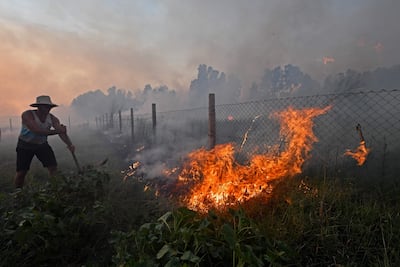Leaving the capital Tunis and driving to Tabarka city in the north-west near the Algerian border, the air gradually becomes thicker and thicker.
Dozens of wildfires – which can be seen from space – have been burning here since Monday afternoon. The sky is blanketed in grey smoke as temperatures remain dangerously high.
The disaster has stirred Tunisian President Kais Saied to rush back from a trip abroad, reaching the fire-ravaged region on Monday night following a conference in Rome.
Mr Saied promised more help would be sent on Tuesday morning from Italy to assist civil defence and military efforts to control the flames.
Civil protection units, backed by forestry workers and the air force, were working to put out fires in several areas of Tabarka.
“I could not sleep last night, I was no longer able to remember something as basic as the act of breathing,” Raouia, 27, told The National.
Raouia, who has Crohn's disease, struggled through the night due to the overwhelmingly thick air surrounding her.
“I had an inflammation flare up as I got dehydrated and could not breathe,” she said. “It felt like judgment day and I was praying that the night would be over soon.”
On the motorway going north, the thickening air is almost visible as soon as traffic reaches Beja governorate. People can be seen gasping for breath – even as fires are extinguished in some areas, smouldering undergrowth leaves palls of grey smoke dotting the landscape.
More than 170 people were evacuated and taken to hospital due to smoke inhalation in Tabarka.
More than 2,300 residents have been placed in schools, youth hostels and other public spaces after being forced to leave their homes. One person has died due to thick smoke from the wildfires, which have spread from forested areas across the border in Algeria amid an intense heatwave in the region.
On Tuesday, the EU's Earth observation satellite showed a pall of grey smoke from the region stretching far across the Mediterranean, drifting close to the Italian island of Sardinia.
Algeria has suffered high casualties, with at least 10 soldiers drafted in to help firemen tackle the inferno.
Moez Tria, spokesman for Tunisian Civil Protection, said priority was being given to protecting residential communities and to prevent the blaze from reaching an airport.
National emergency
The President was joined by his Interior Minister Kamel Feki and other members of the cabinet on his visit.
He met families from Maloula village, the most damaged area in Tabarka.
“We went through different levels of fright that I never knew existed,” primary schoolteacher Amel Maddouri, 24, told The National from Tabarka's Chlaybeya village.
“We couldn't stop crying. We saw houses explode, trees on fire and even firefighters crying.”
Civil defence officials announced on Monday they had been able to fully contain the Maloula fires, however, rescue operations continued after another fire broke out in the nearby city of Jendouba.

Ms Maddouri told The National she couldn't breathe for the “whole night” as flames ravaged nearby mountains.
“I even threw up because of fear.”
More wildfires have been reported in other cities in the north-west, including in the Beja and Bizerte governorates.
Another was reported in Jbel Smema, Kasserine, in central Tunisia, which has experienced record temperatures. Forecasts predict temperatures of between 43ºC and 49ºC in much of the country, Tunisian meteorological services said.
“It’s hot, there’s fire and today it’s Republic Day but Tunisians here have no water, electricity or anything else,” visitor Abdelrahim told The National in Meloula, a village reduced to a smouldering ruin.
Abdelrahim said authorities were disregarding basic needs at a critical time.
“We are struggling with awful topography on the one hand, but on the other, our state does not care about us,” Abdelrahim said. “We don’t need them to just show up, we want them to do tangible things.
“We spent last night in the street until at least 4am. We were suffocating and many people had to rush to get oxygen.”
Taher Hmissi, 76, has lived in Meloula for more than 40 years. He has watched the town grow and blames poor planning for its destruction.
“In recent years, they [forest rangers and authorities] have allowed residential areas and forests to collide without leaving a safety distance between them,” Mr Hmissi said near his house in Meloula, which has escaped destruction.
“They refuse to do their job and also refuse to give us the margin to clean at least about 20 metres of tree cover to prevent such catastrophes.
“Tell Kais Saied to come and try living with us and see how we are being belittled and forgotten.”

